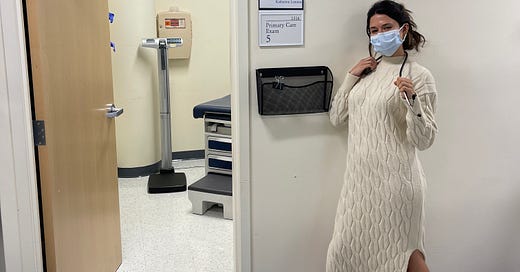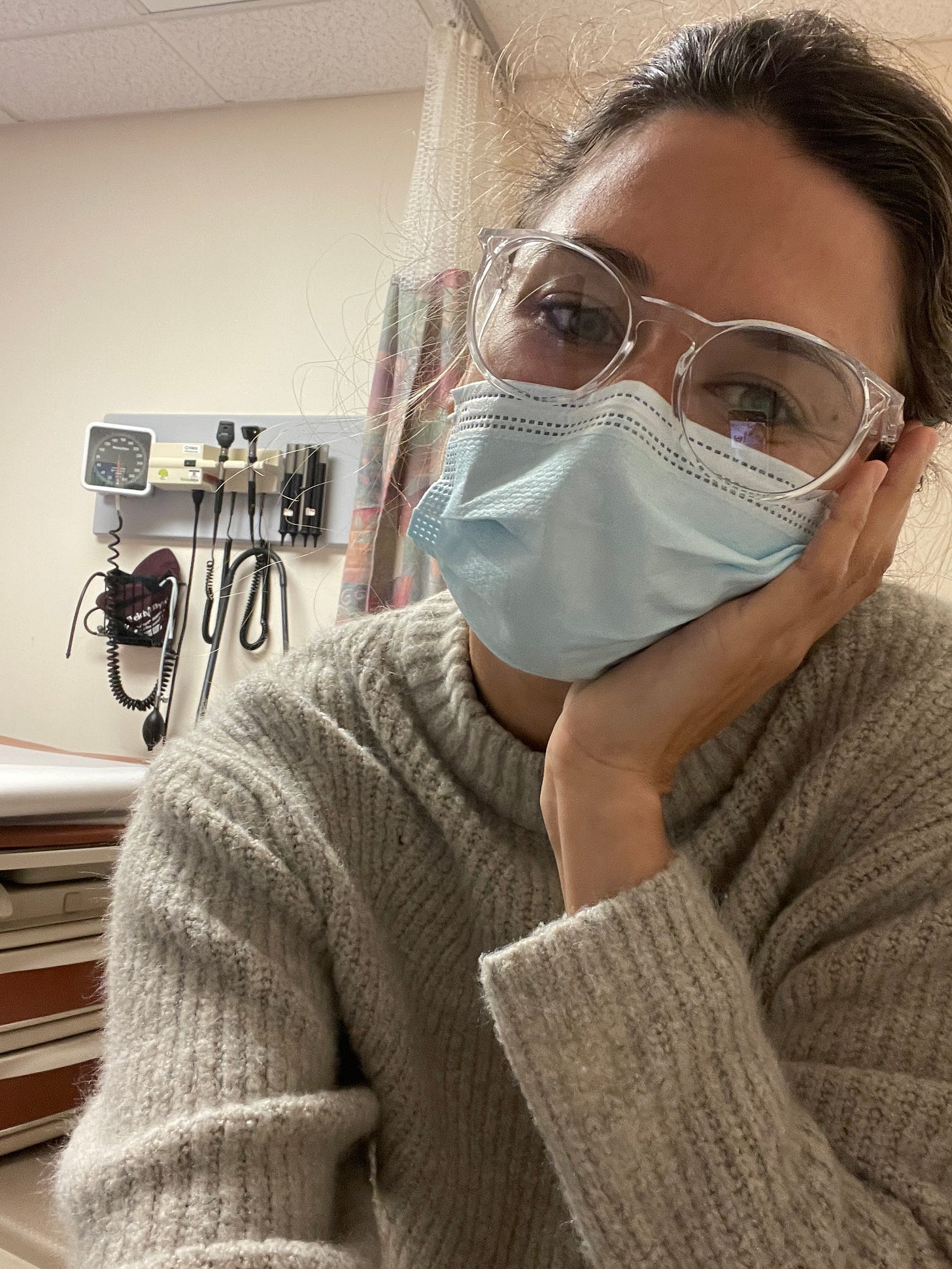“Okay so we’ll have to figure out how to manage your rage,” my medical director said to me after one of our check ins.
This conversation occurred after a particularly trying patient case. It’s one of those cases that will stick with me for the rest of my career honestly. A perfect storm of medically, psychiatrically, and socially complex care arriving during the eye of a burnout week storm (CC last week’s newsletter to get a better idea of what these feel like).
And it was the first time I really lost my shit and my temper on another person at work. Is anyone proud to actually admit this? No. Am I still cloaked in shame about it? Certainly.
To set the scene, I was coming off a few weeks of very complex cases. I was regularly running an hour behind during each session. I was absolutely giving it my all, and yet felt like I wasn’t making a difference. Furthermore, we had a few providers leave and a few more who were on vacation or medical leave so it felt like the skeleton crew.
This adds another layer of challenge because when someone comes back, you have to broad strokes catch them up on the care you’ve been providing so you’re back on the same page.
The patient I was seeing is one that was very familiar to me, though had some PCP turnover during the last few years (super common during COVID). As a PA, I work on PCP teams, meaning I see the panels of two different PCPs alongside them.
For this particularly patient, their original PCP had transitioned to a different role during COVID, so they were seen by another doc in the interim. This physician also ended up moving, so the patient was then assigned to a third PCP in a short amount of time. I was the PA straddling those first two PCP teams, and ended up doing the bulk of the care continuity amidst the physician changes.
The new PCP was one who I didn’t work with regularly, and we had minimal clinic overlapping hours. They were then away from clinic for a few weeks during a time when I was seeing the patient often for subacute concerns. When the PCP returned, we were unable to really connect about the patient, and so they were catching up on the patient’s care based on notes alone.
A LOT got lost in translation. It was just a perfect storm of miscommunication. When you don’t see a patient and only read their diagnoses, especially if the diagnosis list is long and substance use/trauma/mental illness is involved, it’s nearly impossible to get an idea of their historical and current care plan.
I ended up feeling like the work I had been doing for this patient amongst all the PCP care changes went unappreciated and unacknowledged. And the anger was intensified by the patient not having access to see their specialists in a timely manner, AND the patient’s living situation worsening most of their medical/psychiatric diagnoses and feeling entirely powerless to really help them.
I had the opportunity to debrief with my medical director, which is when I was explaining this multi-layered level of anger: with the PCP turnover, challenges to managing the patient through an adequate team based approach, arranging for speciality care, poor access to get in to see specialists, trying and failing to arrange for transportation for the patient, carving out time to speak with other members of the care team, etc.
It’s nearly impossible to dissect the layers in the moment, so you’re hit with one predominant emotion - usually blind rage or other flavor of absolute overwhelm.
I actually didn’t consider myself an angry person before this work. I wear a lot of flaws, though anger isn’t the predominant emotion where I live. So it’s been sort of *fascinating*, let’s say, to examine where this comes from.
I think most go into this work to try to help others on their journey of wellbeing. And I didn’t realize how challenging that would be. It seemed so easy in school! Just answer this multiple choice question correctly and the patient gets better!! Though the reality is, it sometimes feels like you have to move mountains just to move the dial ever so slightly in a more positive / healthful direction.
In any particular day, I’m mad at the system, at my inbox, at the volume of notifications I’m getting, at insurance companies, at not having enough time with patients, at upper upper upper management who don’t do the job yet make decisions that affect the job. Anger is the initial hard hitting emotion, and there’s usually a lot underneath it, but oftentimes no bandwidth to go deeper and see it for more than what it feels like in the moment.
And it just feels like there’s so much to be angry about! It’s unfair there are multi-month long waitlists to see specialists or primary care, that insurance won't cover medications patients desperately need, that providers are tasked with seeing more patients to make up for the deficit of COVID despite working through the pandemic and being so damn tired, that the mountain of paperwork is endless, that I often can’t get patients what they REALLY need (housing, childcare, a higher salary, transportation, therapy in a timely manner, nutrient dense nutrition), that there’s not enough time in patient appointments, that insurance companies and other big businesses have such a firm grasp on healthcare that both patients and providers are so very unhappy and angry.
When you’re in this place - just trying to get through the day with anger seething and bubbling right underneath the surface - it takes just one small mishap for the explosion to occur.
Not only this, there is a LOT of anger coming from patients and others working in healthcare lately. For all of the reasons listed above and then some. I’m not used to holding that anger, trying to acknowledge and validate it, then turning it into something productive. AND doing so in the span of 20 minutes, then picking up and going to the next patient appointment to repeat this process. It’s exhausting, though I entirely see where patients are coming from.
I can’t express this enough - this is absolutely not a comment about patients. If you’re a patient and reading this - I SEE YOU. It sucks!! You are absolutely valid in feeling so angry. For the medication shortages, having to wait months to see your care team, not having enough time to review all the things concerning you about your health despite waiting so long, feeling unheard, feeling dismissed. We do our absolute best, though the system has set us both (patient and provider) up to fail.
Speaking of rage, it’s not entirely maladaptive. I find it to be energizing honestly. It definitely revs adrenaline and is more effective than any source of caffeine. Though it very quickly shifts from energizing to exhausting. It’s heavy to carry; there’s no buoyancy to it. It sits like a rock and lands with a crash.
Furthermore, it is absolute poison to the soul and venom to joy, compassion, silliness, and fun! If I don’t manage my anger - accessing what lies beneath and finding ways to process it out - my physical body is left absolutely depleted. It doesn’t matter how well I’m sleeping, if I’m going on mental health walks / therapy, or eating nutrient dense foods - anger swiftly unravels all of this. It causes me to interpret every situation negatively, makes it very challenging to be excited about the future, and just makes me miserable to be around.
There have been so many weekends in the past few years that I’ve woken up Saturday and felt I was in a fog of depression. Whereas the reality is I was surviving on the fumes of rage all week and once those burn off, I’m incredibly depleted.
So how do we manage this rage? Or turn it into something productive?
I absolutely do think having a physical outlet is important. To move the energy out of the body. I love Emily and Amelia Nagoski’s book called Burnout: The Secret to Unlocking the Stress cycle. In it, they note it takes about 20 minutes to complete a stress cycle. For some this is exercising, for others it’s doing something creative, laughing, vagal nerve stimulation, talking to loved ones, or crying.
Given the whole goal of soft 70 is taking a softer approach, I do like to gently knock at the door of my anger and ask what’s underneath. It’s usually helplessness or sadness or overstimulation/overwhelm. Coming at my anger through the lens of compassion and curiosity rather than condemnation (it’s not a quality I admire about myself so sometimes throws me back in the guilt/shame cycle) has been abundantly helpful. And writing down what got me there in the first place.
If I’m overstimulated - I try to take a step back and remove distractions. I then like to do something to get back into my body to really feel what is there and needs to be released, then process it out of my body.
If you don’t follow already, I find the @somaticexperiencingint Instgram account to be lovely and a great way to feel and process out sticky emotions.
I also turned to the wonderful wisdom of you all and here’s what we said:
Breath retention - work up to 2 minutes holding
I have to be able to name it, hopefully to someone who validates
Physical movement, dance/scream/sing in my car
Run, scroll my phone, scream in my car alone while listening to music
Let it pass through you, feel it and let it go. Walks, weight lifting, yoga, runs
EFT tapping
Boxing classes!
Not well but try to find the root of it and see if I can change my attitude. Can’t if it’s PMS
empathy
Humor - make it seem funny like on a sitcom, laugh at it
The only thing that works is starting the day on an endorphin kick
Pause! Sit with the feeling and reflect, but don’t knee jerk react
Taking a walk outside by myself
Writing and burning
Chinese herbal formulas and acupuncture
Name it, understand what triggered it and try to express in a non destructive way
Journal or vent to a friend, better out than in
Scream sing 2000s emo music alone in my car
Heavy lift with loud music and grunting if no one else is around
When I learned I don’t need to be afraid of my anger and that I can trust myself, it helped
Scream in my car to All Too Well (10 minute version)
Strength training and sitting with the feeling. Or bench pressing through it I suppose
Zoloft has *changed my life*
Sometimes I just stand and do nothing and breathe until I can calm down
Run really fast and far
Primal screaming, tiger practice, stomping
Figuring out what the root of my anger is and working that out
Cry it out
Let myself cry for awhile and then re-focus on my goal
Get outside and spend time alone to reflect and process
Bitching to someone and kickboxing
Hot yoga! Literally sweat that shit out
Shaking and quiet “screams” (so that I don’t scare the neighbors)
Karma and reminding myself that bad behavior/intent comes back to bite everyone eventually
Zoloft
Let myself feel it. Rage cry. Then remember “being softer will yield better results.”
deep breathing and prayer
I take a walk. I ask myself, “is this worth my peace?” I make a plan to remove it from my life.
It’s a struggle! Deep breathing, music, acknowledging/knowing it will pass. Also sometimes rage cleaning my apartment helps.
edibles and magnesium, strict sleep routine. Good night’s sleep = good day.
Scream and then put things into perspective
Name and validate it, regulate with movement, process with a friend, make an action plan
Set reminders in my phone to check in with myself at times when I’m usually triggered
Prayer
Consistent meditation
Intense cardio, smashing things in a rage room, listening to intense music/screaming
Journaling, crying, exercising, using my voice, talking it out, making art
Youtube meditations for releasing anger to help my brain stop spinning
Hitting golf balls
Walks, binaural beats, therapy, tv, books, acknowledging the emotion
Label the emotion, breathe with it, and remind myself I don’t have to act on it
Dance class
I ask myself what I’m trying to avoid feeling, 9/10 I’m deeply scared or sad and masking with anger
Brain dump in my journal followed by gratitude and goals. Fast walk with good tunes
Therapist suggested I journal, hold an ice cube, 5 senses exercise
Addressing the root cause - 99% of mine comes from overstimulation
Do something I love, sometimes scream into a pillow and cry
Community. When I’m with others that I align with, I remember I can’t fix it all
Ugly cry and go to therapy
Cry it out then run it out
Titration - little bits at a time, and getting curious about how I can use it to mobilize into action
Essentially I’ve become a marathon runner since working in healthcare
Vent to a friend and do one positive actionable item
This is no time for toxic optimism because we need a systems based change within many public health systems, though I do hope some of the above can help in the moment.
A little less angrily than when I started,
Katie








The healthcare system is so frustrating. The work you’re doing and the amount of care you put into it is so important. Thanks for sharing all of this!